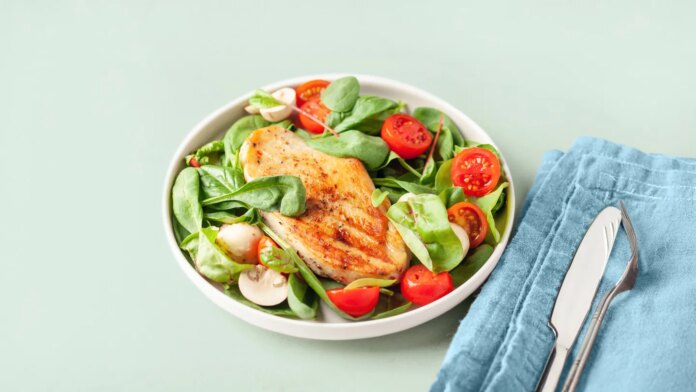3 Food regimen Adjustments to Assist Your Gallbladder
There aren’t any particular meals that instantly trigger gallstones. Nonetheless, analysis has discovered that diets excessive in refined sugars and saturated fat and low in fiber are related to an elevated danger of gallstones. In keeping with Harvard Well being Publishing, slicing down on sure substances, equivalent to saturated fats, could assist you preserve a wholesome weight, which can scale back your danger of gallstones.
That mentioned, different research present that fast weight reduction can contribute to the formation of gallstones.
For those who’re at an elevated danger of creating gallstones, your physician or a registered dietitian may advise some particular weight-reduction plan adjustments, like rising your fiber consumption and taking inventory of your protein sources.
Switching from meat excessive in saturated fat (which might increase your LDL, or “unhealthy,” levels of cholesterol) to various kinds of protein, for instance, could make a distinction, in line with the American Coronary heart Affiliation. Listed below are three extra particular ideas:
1. Lower Down on Fatty Meats
Lowering the quantity of meat you eat, significantly high-fat meats like beef and bacon, could assist scale back the quantity of ldl cholesterol buildup in your gallbladder.
For context, a 3-ounce floor beef patty with 70 p.c lean meat and 30 p.c fats has about 202 energy, 13.2 grams (g) of fats (with 5.17 g from saturated fats), and 71.4 milligrams (mg) of ldl cholesterol, in line with the U.S. Division of Agriculture (USDA). Three ounces of pan-fried cured bacon have about 460 energy, 35.5 g of fats (with 11.6 g from saturated fats), and 93.5 mg of ldl cholesterol, notes the USDA.
The American Coronary heart Affiliation recommends limiting your saturated fats consumption to lower than 6 p.c of your each day complete energy. To test in with how a lot you’re getting, strive preserving a meals diary for per week to seek out the place you’ll be able to in the reduction of.
2. Select Low-Fats Meat Choices
For those who’re watching your saturated fats consumption however nonetheless need to eat meat, you’ll be able to select lower-fat choices when potential. For instance, you should purchase leaner cuts of beef or poultry — like turkey and rooster.
A 3-ounce broiled beef patty with 97 p.c lean meat and three p.c fats has about 130 energy, 3.79 g of fats (with 1.88 g from saturated fats), and 26.4 g of protein, in line with the USDA. Three ounces of 93 p.c lean floor turkey has about 176 energy, 9.69 g of fats (with 2.52 g from saturated fats), and about 22 g of protein, notes the USDA.
Equally, 3 ounces of skinless, white-meat rooster has about 123 energy, 3.07 g of fats (with 1.01 g from saturated fats), and 24 g of protein, in line with the USDA.
Generally, the American Coronary heart Affiliation recommends that meat merchandise include 15 p.c or much less of saturated fats. If that’s tough to seek out, you may as well trim off any seen fats on the meat earlier than you prepare dinner it.
3. Add Seafood and Vegetarian Proteins
If you’re vulnerable to gallstones or different gallbladder points, getting protein from fish and different seafood is a wonderful possibility.
The USDA notes {that a} 3-ounce serving of cooked sockeye salmon has about 133 energy, 4.73 g of fats (with lower than 1 g of saturated fats), 51.8 mg of ldl cholesterol, and 22.5 g of protein. Shellfish can be excessive in protein and low in fats, with 3 ounces of cooked shrimp containing 84.2 energy, lower than 1 gram of fats, 161 mg of ldl cholesterol, and 20.4 g of protein, in line with the USDA.
Switching to vegetarian protein as a lot as potential also can assist decrease your saturated fats consumption, in line with the Nationwide Coronary heart, Lung, and Blood Institute. Beans, tofu, legumes, and peas are all good sources of protein which might be low in fats and ldl cholesterol.


